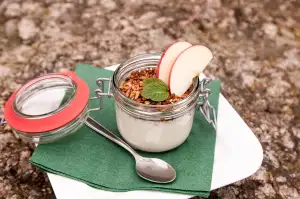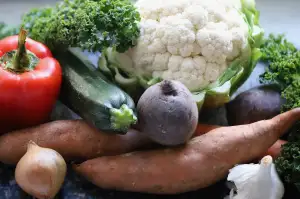Spice Up Your Mealtime with this Flavorful Curry Recipe!

Curry is a beloved dish that originates from the Indian subcontinent but has gained popularity worldwide for its rich and aromatic flavors. It is a versatile dish that can be made with various proteins such as chicken, lamb, or vegetables, combined with a blend of spices and herbs. The key to a delicious curry lies in the combination of these spices, which can vary greatly depending on regional traditions and personal preferences. Whether you prefer it mild or spicy, creamy or broth-based, there is a curry recipe out there to suit every palate.
Ingredients Required for Making Curry
Curry, a beloved dish known for its rich and aromatic flavors, requires a blend of essential ingredients to achieve its signature taste. To prepare a delicious curry at home, you will need the following key components:
1. Protein: Choose your preferred protein such as chicken, beef, lamb, shrimp, tofu, or chickpeas.
2. Vegetables: Include an assortment of vegetables like onions, tomatoes, bell peppers, potatoes, carrots, and peas.
3. Aromatics: Garlic and ginger are essential for adding depth to the flavor profile.
4. Spices: The heart of any curry lies in the spice blend which typically includes cumin, coriander, turmeric, chili powder, and garam masala.
5. Liquid: Use broth, coconut milk, yogurt, or water as the base for your curry sauce.
6. Oil: Opt for cooking oil like vegetable oil or ghee to sauté your ingredients.
By having these fundamental ingredients on hand, you can embark on a culinary journey to create a tantalizing curry that will surely delight your taste buds.
Step-by-Step Instructions for Cooking Curry
1. Heat oil in a pan over medium heat and add diced onions, cooking until softened.
2. Stir in minced garlic and ginger, cooking for another minute until fragrant.
3. Add your choice of curry powder or paste to the pan, stirring well to coat the aromatics.
4. Pour in coconut milk or broth to create a creamy base for your curry.
5. Add vegetables, protein (such as chicken, tofu, or shrimp), and any additional desired ingredients like potatoes or lentils.
6. Simmer on low heat for 20-30 minutes, allowing the flavors to meld together.
7. Taste and adjust seasoning with salt, pepper, or additional spices as needed.
8. Serve hot over steamed rice or with naan bread for a complete meal experience.
Tips and Tricks for Enhancing the Flavor of Your Curry
To enhance the flavor of your curry, consider toasting whole spices like cumin, coriander, and cardamom before grinding them for a richer taste. Additionally, blooming spices in hot oil at the beginning of cooking can bring out their essential oils and intensify the flavor profile. Experiment with adding a splash of coconut milk or yogurt towards the end of cooking for a creamy texture. Don't forget to balance the flavors with a touch of sweetness from honey or palm sugar and acidity from lemon juice or tamarind paste. Lastly, garnish your curry with fresh herbs like cilantro or mint right before serving to add a burst of freshness.
Serving Suggestions and Pairings for Curry
When it comes to serving curry, there are various delicious options to consider. One classic choice is to serve it with steamed white rice or fragrant basmati rice, which helps balance out the bold flavors of the curry. Naan bread or roti are also popular accompaniments that can be used for dipping and scooping up the savory sauce.
For a healthier twist, you can pair your curry with quinoa or cauliflower rice for a low-carb alternative. Additionally, adding a side of fresh cucumber raita or yogurt-based salad can provide a cool contrast to the spiciness of the curry.
If you're looking to elevate your meal further, consider serving your curry alongside traditional Indian condiments like mango chutney, lime pickle, or pickled onions. These add an extra layer of flavor and texture to each bite.
For drinks, pairing your curry with a refreshing beverage like lassi (a yogurt-based drink) or a cold beer can complement the richness of the dish. And don't forget to garnish your curry with fresh cilantro leaves, sliced red chili peppers, or a squeeze of lemon juice for added freshness and visual appeal.
Variations and Adaptations of Curry Recipes
Curry is a dish that lends itself well to experimentation and customization. Depending on the region and culinary traditions, there are countless variations of curry recipes. For example, Indian curry often features a blend of aromatic spices like cumin, coriander, turmeric, and garam masala, while Thai curry incorporates ingredients such as lemongrass, galangal, and coconut milk for a unique flavor profile.
Vegetarians can enjoy delicious vegetable curries with ingredients like potatoes, cauliflower, peas, or eggplant. Meat lovers can savor chicken curry, lamb curry, or even seafood curry with prawns or fish. Additionally, those seeking healthier options can opt for lighter versions by using yogurt instead of cream or incorporating more vegetables.
For those looking to spice things up further, adding fresh chilies or chili powder can bring extra heat to the dish. Experimenting with different herbs like cilantro or mint can also provide a refreshing twist to traditional curry recipes.
Furthermore, fusion curries have become increasingly popular in modern cuisine. Combining elements from various culinary traditions such as Japanese curry with its thick roux base or Caribbean curry with its use of scotch bonnet peppers can result in innovative and exciting flavor combinations.
Whether you prefer a mild and creamy curry or a fiery and bold one, the adaptability of this dish allows for endless possibilities to suit every palate. Get creative in the kitchen and tailor your curry recipe to your taste preferences for a truly personalized dining experience.
In conclusion, homemade curry offers a delightful journey of flavors that can be tailored to suit individual preferences. The combination of spices, herbs, and ingredients creates a dish that is not only delicious but also versatile and comforting. By experimenting with different variations and adapting recipes to your liking, you can truly make each curry experience unique. So, next time you're looking to spice up your mealtime, consider indulging in the rich and aromatic delights of homemade curry - a dish that never fails to satisfy the senses.
Published: 14. 06. 2024
Category: Recipes



